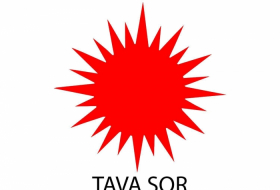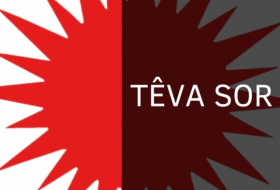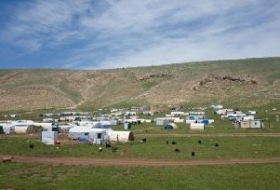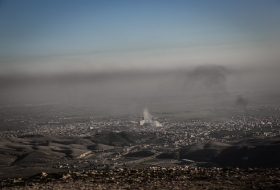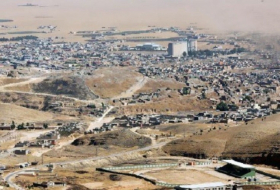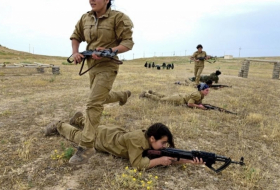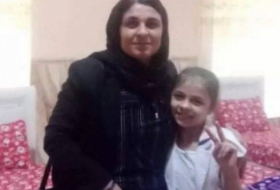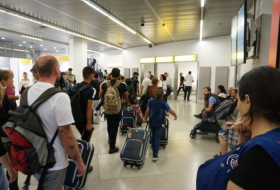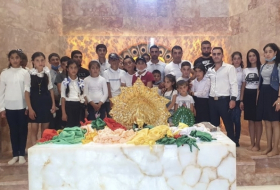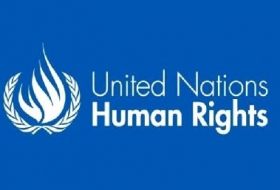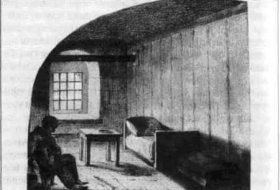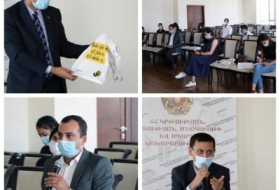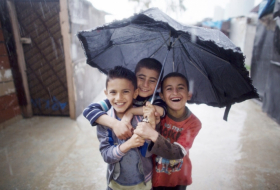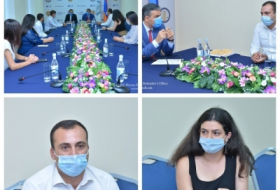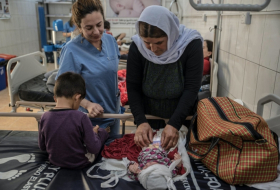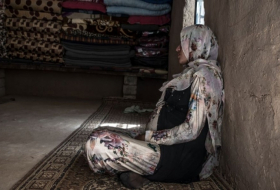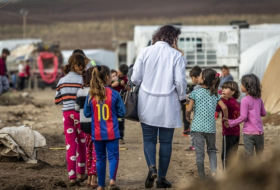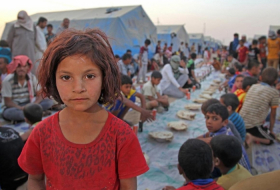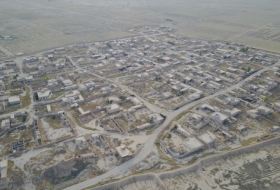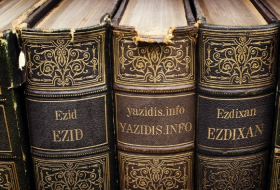Yazidi community: "It is very important for us that the native language of the Yazidis is recognized and considered as part of the linguistic and cultural heritage where we live"
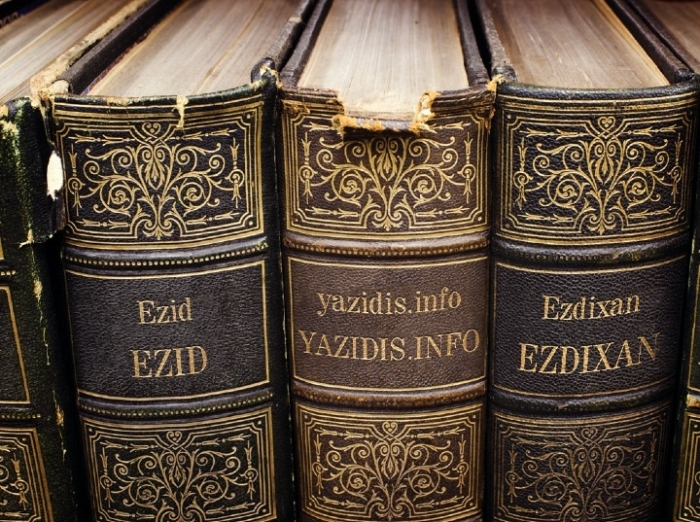
The Yazidi community in all countries of residence should participate in cultural, social, economic and socio-political life, thus integrating into the life of the entire society in the countries of residence. The Yazidi community in their countries of residence should not only have the right to their own identity, culture and religion, but should also have the right to a full education.
Representatives of the Yazidi community in the country of residence: in Georgia, in Armenia, in Russia note: "It is very important for us that the native language of the Yazidis is recognized and considered as part of the linguistic and cultural heritage of the countries where we live, be it Germany, Russia, Georgia or Armenia. Today, we need the authorities of these countries to conduct an active and consistent policy in the field of education in order to protect our rights to full-fledged education in our native language."
This implies, first, the need to learn the state language in the countries of residence, and at the same time, the availability of appropriate opportunities to learn their native language or in their native Yazidi language. Unfortunately, we see that there are tendencies to strengthen state language teaching by reducing teaching in the native language.
Today, education is a tool for preserving identity, including outside the zones of significant or traditional residence of the Yazidi community, whether in Germania, Georgia, Russia, Armenia, or in the whole world. Education concerns not only the system of regular compulsory secondary school education, but also pre-school, higher and special education.
Today, the Yazidi community has a great need for professional education, adult education, and training of professional groups, including lawyers, police, journalists, government officials, and even political and public figures.
You can also add educational activities outside of traditional schools, such as religious education classes or summer educational camps.
Over the past decade, when talking about the Yazidi community, people have begun to talk about education for national minorities very narrowly - only about secondary education. This attitude creates a lack of competition for the Yazidi community in their countries of residence. This thinking makes the Yazidis very, very weak as a community, and this affects the real lack of representation in many areas of social and political life in their countries of residence. The process of education does not end only with the fact that the Yazid has finished high school, because the process of education should go through life.
Today, we can state that the system of education in the native language of the Yazidis around the world is gradually being destroyed, and this process has been going on for the past 30 years. Today, many problems in the field of education are laid with preschool education. In Russia, Georgia, and Armenia, several international norms are violated in this regard, which clearly indicate the country's obligations to guarantee the right to education at all stages of personal development.
The reality is that in view of the importance of pre-school education in their native language, the educational system of these countries has ceased to consider the language and culture of the Yazidis, even in places where the Yazidi community lives compactly. These are almost all localities of the Yazidi community that have not had a Yazidi preschool in their native language for the past 30 years.
I would like to remind you that the half-million Yazidi community in the countries of residence does not have pre-school institutions or orphanages in their native Yazidi language.
Many Yazidis, Yazidi organizations and international organizations perceive such steps as assimilation. There are no pre-school institutions, which means that children enter schools with a non-native language sector, without primary training. Many specialists, legal experts, and human rights defenders consider this a restriction on the right to education, and this restriction makes itself felt in the future in the performance of students, while studying they always face difficulties in obtaining education in their native language.
Naturally, in places where Yazidis are dispersed, parents begin to think about sending their children to kindergartens in the language of the titular nation, and later to schools with a non — native language sector. All this is so interconnected and intertwined, but in the end it comes down to one thing — the virtual disappearance of the right and opportunity of Yazidis to receive education in their native language.
It is important to note that we are talking about the existence of an international and constitutional right to receive education in their native language. When this right to opportunity disappears, it is already discrimination, and the direction of the entire Yazidi community towards assimilation.
Today's children and entire generations before that from areas of compact residence for the most part do not know how to read or write in their native language, and they prefer not to speak in their native language. They were denied the opportunity to receive education in their native language.
If you look closely at the Yazidis today, they have features of blurring ethnic identity, identity, there are features of assimilation. Naturally, the Yazidi community, the socially active part of the Yazidis, has a fear that the same method of education will continue in secondary schools in all countries of residence and in the future.
Unfortunately, in the countries of residence, the educational programs of Yazidis do not properly include such subjects as national history, culture, etc. The history and geography of the Yazidi people are not taught in their native language, nor in the state language, making the education process very poor.
It is noteworthy that most Yazidi teachers, not openly, of course, for fear of losing their jobs, spoke out against the above-mentioned program for a number of reasons, mainly because of the gradual loss of the right to education in their native language.
In secondary schools, subjects such as national history, culture and religion of the Yazidi people are not taught at the proper level, and some subjects are taught in the majority language. School leaders and some teachers threatened the Yazidi community with assimilation for their careers and under pressure from the "upper classes".
As many Yazidi public organizations around the world note and state, today the Yazidi community faces the threat that in the next 20 years Yazidis will lose their education completely in their native language and their identity.
The Yazidi community does not see any interest on the part of the educational structures of the countries of residence in resolving the above-mentioned problems, training national personnel for pre-school institutions and for secondary schools of the Yazidi community. It is becoming obvious that States are not interested in training personnel and teachers for the educational system of the Yazidi community. This situation is contrary to international obligations and the legislation of these countries themselves. Today, it is important for the Yazidi community that political and practical actions aimed at assimilation of the Yazidi community be suspended. It is important for the Yazidi community to establish a structure that will help prepare the curriculum for Yazidis in public schools, develop textbooks and seek funding jointly and in collaboration with individuals belonging to the Yazidi community. Yazidi organizations need to start actively participating in the development and implementation of educational programs for the Yazidi community. Today, more than ever, it is necessary to create equal opportunities for the Yazidi community to access education at all levels.
yazidis.info
Tags: #yazidisinfo #newsyezidi #aboutyazidi #cultureyezidi #yezidiofworld #humanrights

